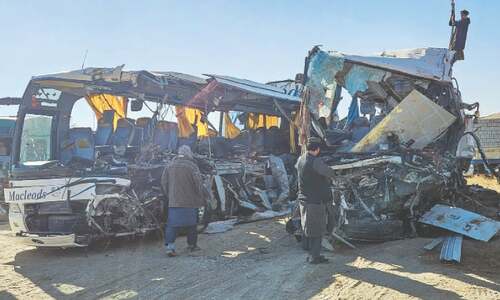OSLO: Half a century after the first atomic power plant opened at Obninsk near Moscow, climate change is widening the environmental appeal of nuclear power despite a lack of final storage for the most toxic waste.
The world’s 439 nuclear power plants emit almost no greenhouse gases and so avert the equivalent of the emissions of Japan every year, according to some studies, compared with the average for electricity generated by burning fossil fuels.
But risks of accidents, such as at Chernobyl in 1986 in what is now Ukraine, mean anguished decisions for governments attracted by nuclear power as a weapon to fight global warming.
“Nuclear is not a straightforward choice,” said Rajendra Pachauri, head of the UN Climate Panel that shared the 2007 Nobel Peace Prize with former US Vice President Al Gore.“You can’t ignore it, it accounts for 16 or 17 per cent of the electricity generated in the world,” Pachauri said.
“But you need institutions in place to handle it, places for disposal...I think it’s a sovereign decision for each country.”
Some waste will be toxic for thousands of years and no permanent repositories exist for high-level waste, more than five decades after the Obninsk reactor opened in June 1954.
Nevertheless, Britain decided to invest in a new generation of nuclear power stations this month, Finland and France are building new plants, while companies in the United States have begun filing licence applications.
Thirty-four plants are under construction worldwide.
While some people are warming to nuclear power, partly because of climate change, security of supply and oil prices close to $100 a barrel, others say opposition is undimmed.
“There’s a big hype about a ‘nuclear renaissance’, saying that countries are looking more positively at nuclear power, arguing about climate change and security of supply,” said Jan Beranek of the Greenpeace environmental group.
“It’s a dead end,” he said, arguing that nuclear energy was soaking up investment that could otherwise go to renewable energies such as wind, hydro, solar or tidal power.
“There are huge storage problems with nuclear power,” said Norwegian Environment Minister Erik Solheim, whose country has never had nuclear power. Oslo favours a drive for technology to bury carbon dioxide emissions from fossil fuel power plants.Still, Pachauri’s UN climate panel said in 2007 that “nuclear power is an effective greenhouse gas mitigation option.”
The panel quoted a study saying that nuclear power already avoids 1.5 billion tonnes of greenhouse gases a year compared with the world average emissions for electricity generation.
By comparison, Japan’s greenhouse gas emissions in 2005 were 1.4 billion tonnes.
Other studies put emissions from nuclear higher because of factors such as ore processing and decommissioning.
And there are public doubts about the environmental impact, alongside fears of terrorist attacks on plants or that states might use the technology to make bombs.
“With nuclear the first reaction is still: ‘Oh, Chernobyl’,” said Ferenc Toth, senior energy economist at the International Atomic Energy Agency (IAEA).The IAEA says the leak at Chernobyl is likely to kill 4,000 people from radiation-induced cancers among the 600,000 people nearest the plant and perhaps another 5,000 further away.
Toth said that environmental benefits of nuclear power such, as cutting greenhouse gas emissions, were less known. Even for developing nations, nuclear power could be an attractive environmental option, he said.
It could help countries such as China to curb smog in cities including Beijing. In India, one IAEA study indicated that nuclear power could compete more than 800km from coal mines, because of high transport costs, Toth said.
And he noted that big developing nations were also looking at ways to curb their rising greenhouse gas emissions in the long term, even though they have no curbs under the UN’s Kyoto Protocol meant to slow climate change until 2012.—Reuters













































Dear visitor, the comments section is undergoing an overhaul and will return soon.